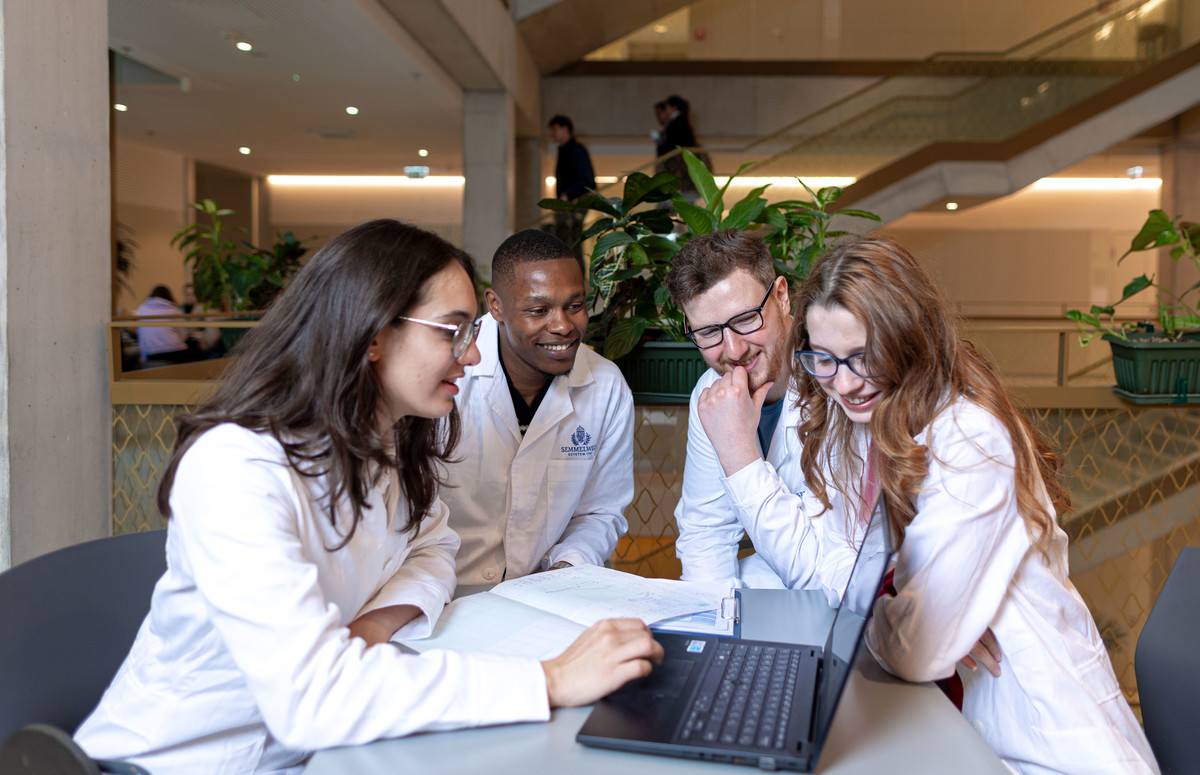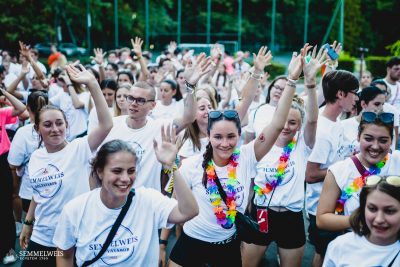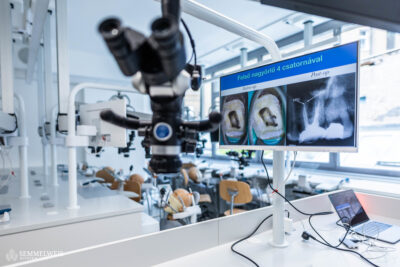“We started the predecessor of the Mentoring Program when I was in my sixth year within the umbrella of the Budapest Medical Students’ Association (BMSA), based on Dr. Dorottya Árva’s previous idea. A year later we developed it into a university-wide program with the help of the then student Dr. Márk Jámbor, and with the support of Dr. György Purebl, Director of the Institute of Behavioral Sciences and with the specialist help of Associate Professor Dr. Zsuzsa Győrffy,” recalled Dr. András Végh, Chief Advisor of the program and also a specialist doctor candidate at the Department of Ophthalmology.
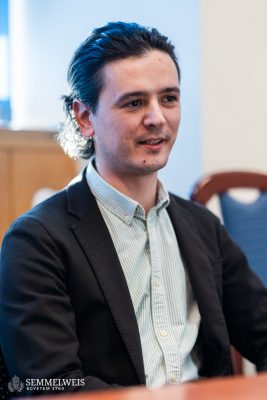 “The mentoring program currently available to students of the Faculty of Medicine has developed dynamically over the past five years, as the number of students has tripled since its launch, so the need arose to extend it to international students as well,” explained the chief advisor. Thus, starting in September, students participating in the English- and German-language programs can also enjoy the benefits of the Student Mentoring Program.
“The mentoring program currently available to students of the Faculty of Medicine has developed dynamically over the past five years, as the number of students has tripled since its launch, so the need arose to extend it to international students as well,” explained the chief advisor. Thus, starting in September, students participating in the English- and German-language programs can also enjoy the benefits of the Student Mentoring Program.
According to Dr. András Végh, the start of university student life comes with a psychosocial crisis for Hungarian students as well, since everything changes in their lives, and those coming from abroad not only enter a new education system, but also have to start a new life in a completely different location. “Previously, I taught anatomy and biochemistry to first- and second-year students for five years as a practice supervisor, so I know from my own experience how lost the first-year students can feel in the new education system, since it is completely different from high school,” said Dr. András Végh. This is why the mentoring program was created so that a peer, a student who is close to the freshman in terms of age, accompanies them throughout the first year, who, having already successfully overcome the same problems, motivates and helps them through the more difficult moments drawing from their own experience.
In the first year of study, mentors provide comprehensive support: they help the freshmen to integrate into university life, they give practical advice related to everyday life and studies while constituting a kind of safety net for them, since they can turn to the mentors at any time with any problem. Accordingly, the primary goal of the program is to “coach” healthy young adults in a completely new life situation; while the secondary goal is to screen students in need of psychological help and support them in getting the appropriate care as soon as possible.
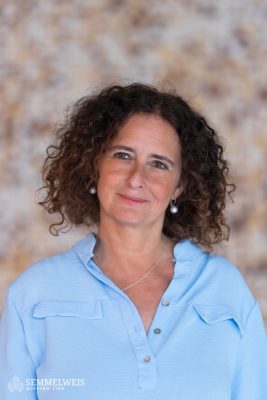 Dr. Zsuzsa Győrffy, Chief Advisor to the program, highlighted that in order for a student to become a mentor, they must take part in the training organized according to rigorous professional critera, where, among other things, the future mentors familiarize themselves with the expectations of the program, learn the basics of peer support and non-directive counseling, they gain insight into the basics of learning methodology, they get prepared to recognize when their mentee needs psychological help, and learn where and how they can advise the mentee further. “We provide the opportunity to develop various ‘soft skills’ that are useful in mentoring, medical work and private life alike, such as stress management or assertiveness,” she added. Based on student feedback, the curriculum is improved on a yearly basis.
Dr. Zsuzsa Győrffy, Chief Advisor to the program, highlighted that in order for a student to become a mentor, they must take part in the training organized according to rigorous professional critera, where, among other things, the future mentors familiarize themselves with the expectations of the program, learn the basics of peer support and non-directive counseling, they gain insight into the basics of learning methodology, they get prepared to recognize when their mentee needs psychological help, and learn where and how they can advise the mentee further. “We provide the opportunity to develop various ‘soft skills’ that are useful in mentoring, medical work and private life alike, such as stress management or assertiveness,” she added. Based on student feedback, the curriculum is improved on a yearly basis.
The mentor trainings are held every year in the summer, and medical students at least in their third year can then register for the elective, two-credit course. Those interested can find out about the exact application process and deadlines on the program’s website.
The associate professor pointed out that those who experienced what it is like to be a mentee would be happy to become mentors themselves. In the foreign language program one mentor is assigned to several mentees. “The experiences of the first semester are positive, and the feedback proves the success of the program”, highlighted Dr. Zsuzsa Győrffy. “I wish there had been such a program when I was a freshman”, the mentors of the international program stated in their feedback after the successfully completed first semester. With the help of this unique program, freshmen get to start the spring semester with renewed enthusiasm. The social media sites of the mentoring program will also be launched soon, which will provide new platforms for networking, exchanging information and communication, explained Dr. Zsuzsa Győrffy.
Dr. György Purebl emphasized that the goals of higher education, especially that of medical education, have changed a lot in the recent period:
We need to train professionals who not only have professional knowledge, but who can also apply it in practice, who are also confident, who can handle work-related e stress, and who can therefore stay in the medical field in the long term.
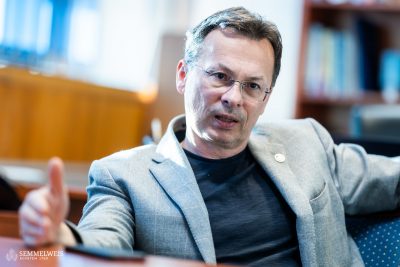 He also highlighted that the Student Mentoring Program also plays a major role in dealing with or stopping dropout, and helps prevent mental problems – 75 percent of which start at a young age –, and the frequency of which has increased significantly among higher education students in recent years. The director added that participants of the mentoring program can get treatment more easily and quickly. He explained that there are several Hungarian-language welfare services that support mental health at the university, such as the Employee Counseling Service, and the Student Psychological Counseling Service.. The Student Mentoring Program, also available for international students, fits into this portfolio, he added.
He also highlighted that the Student Mentoring Program also plays a major role in dealing with or stopping dropout, and helps prevent mental problems – 75 percent of which start at a young age –, and the frequency of which has increased significantly among higher education students in recent years. The director added that participants of the mentoring program can get treatment more easily and quickly. He explained that there are several Hungarian-language welfare services that support mental health at the university, such as the Employee Counseling Service, and the Student Psychological Counseling Service.. The Student Mentoring Program, also available for international students, fits into this portfolio, he added.
According to Dr. Zsuzsa Győrffy, the program also serves awareness raising purposes has a sensitizing function too. They have found that the mentors grow much more aware of the problems in their own environment. In addition, mentors gain experience with forming a responsible and caring relationship before they graduate, which will be crucial later on in their doctor-patient relationship as well. She also emphasized that continuously monitoring the success of the program is unique: with a follow-up they measure whether there has been a change in the mental state of the freshmen and the mentors. Experiences show that the mental agility and resilience of the participants in the program increases, she went on to say.
The mentors are not left alone either, as they can discuss difficult situations, outline possible solutions, summarize, and reflect upon their experiences during supervision group sessions.
“The success of the program is shown by the fact that the number of our students has tripled since its launch in 2019: in 2018, 35 pairs participated in the prototype of our program, whereas today we have 160 mentor-mentee pairs in the Hungarian-language training, and nearly 70 in the newly launched English- and German-language training,” concluded Dr. András Végh. The Student Mentoring Program is currently available to students of the Faculty of Medicine, but there are plans regarding its extension to all faculties over time.
Bernadett Bódi
Translation: Mária Sánta
Photo: Bálint Barta – Semmelweis University
